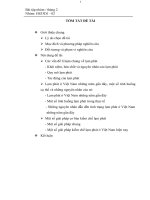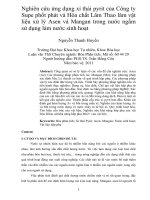Khả năng chịu trách nhiệm tại nơi làm việc
Bạn đang xem bản rút gọn của tài liệu. Xem và tải ngay bản đầy đủ của tài liệu tại đây (1.53 MB, 101 trang )
Accountability in the Workplace
Training Manual
Atlantic Speakers Bureau and Human Skills Development Student
Manual
www.atlanticspeakersbureau.com
www.humanskillsdevelopment.ca
980 Route 730, Scotch Ridge NB Canada E3L 5L2 1-506-465-0990 FAX:
1-506-465-0813
1
All Materials are Copyright Protected
TABLE OF CONTENTS
Module One: Getting Started .............................................................................................................6
Workshop Objectives ................................................................................................................................ 6
Pre-Assignment ......................................................................................................................................... 7
Pre-Test ..................................................................................................................................................... 8
Action Plan .............................................................................................................................................. 12
Evaluation Form...................................................................................................................................... 13
Module Two: What is Accountability? .............................................................................................. 15
Defining Accountability........................................................................................................................... 15
*Personal Accountability ........................................................................................................................ 17
Being Held Accountable .......................................................................................................................... 17
Accountability vs. Blame ......................................................................................................................... 18
Understanding the Importance .............................................................................................................. 18
Practical Illustration................................................................................................................................ 19
Module Two: Review Questions.............................................................................................................. 20
Module Three: Creating an Accountable Workplace .......................................................................... 22
Modeling Accountability ......................................................................................................................... 22
Valuing Accountability ............................................................................................................................ 23
The Front-Loading Benefits..................................................................................................................... 23
Teamwork ............................................................................................................................................... 24
The Accountability Cycle ......................................................................................................................... 24
Practical Illustration................................................................................................................................ 25
Module Three: Review Questions ........................................................................................................... 26
Module Four: The C’s of Accountability............................................................................................. 28
1
Clarification............................................................................................................................................. 28
Common Purpose.................................................................................................................................... 29
Communication....................................................................................................................................... 29
Collaboration .......................................................................................................................................... 29
Consequences ......................................................................................................................................... 30
Practical Illustration................................................................................................................................ 30
Module Four: Review Questions ............................................................................................................. 31
Module Five: Building Ownership ..................................................................................................... 33
Ownership vs. Accountability.................................................................................................................. 33
The Ownership Mentality ....................................................................................................................... 34
*Why Does it Matter?............................................................................................................................. 35
The Weight of Micromanaging ............................................................................................................... 35
Sharing Your Vision ................................................................................................................................. 36
Practical Illustration................................................................................................................................ 36
Module Five: Review Questions .............................................................................................................. 37
Module Six: Accountability in Leadership.......................................................................................... 39
What is Leadership? ............................................................................................................................... 39
The Role of the Organization .................................................................................................................. 40
The Role of the Manager ........................................................................................................................ 41
The Role of the Employee ....................................................................................................................... 41
Strengthening Leadership Accountability ............................................................................................... 42
Practical Illustration................................................................................................................................ 43
Module Six: Review Questions ................................................................................................................ 44
Module Seven: The Power of Goal-Setting ........................................................................................ 46
Setting SMART Goals .............................................................................................................................. 46
Who is Accountable? .............................................................................................................................. 47
2
Identifying Your “Why” ........................................................................................................................... 47
Goal Lengths ........................................................................................................................................... 48
Remaining Loyal to Your Goals ............................................................................................................... 48
Practical Illustration................................................................................................................................ 49
Module Seven: Review Questions ........................................................................................................... 50
Module Eight: Feedback as a Tool ..................................................................................................... 52
Choosing Positivity .................................................................................................................................. 52
Considering the Time Frame ................................................................................................................... 53
Giving Feedback ...................................................................................................................................... 53
Receiving Feedback................................................................................................................................. 54
Creating an Action Plan .......................................................................................................................... 54
Practical Illustration................................................................................................................................ 55
Module Eight: Review Questions ............................................................................................................ 56
Module Nine: Effective Delegation ................................................................................................... 58
What is Delegation? ............................................................................................................................... 58
How to Delegate ..................................................................................................................................... 59
When to Delegate ................................................................................................................................... 59
*To Whom Should You Delegate ............................................................................................................ 60
Dismissing Delegation ............................................................................................................................ 60
Practical Illustration................................................................................................................................ 61
Module Nine: Review Questions ............................................................................................................. 62
Module Ten: Barriers to Accountability............................................................................................. 64
Closed Communication ........................................................................................................................... 64
Failure to Meet Expectations .................................................................................................................. 65
Lack of Self-Confidence ........................................................................................................................... 65
Lacking Alignment .................................................................................................................................. 66
3
Overcoming Obstacles ............................................................................................................................ 66
Practical Illustration................................................................................................................................ 67
Module Ten: Review Questions .............................................................................................................. 68
Module Eleven: The Benefits of Accountability ................................................................................. 70
Improving Performance .......................................................................................................................... 70
Building Trust and Integrity .................................................................................................................... 71
*Employee Engagement ......................................................................................................................... 71
Workplace Satisfaction ........................................................................................................................... 72
Dedication to Your Role .......................................................................................................................... 72
Practical Illustration................................................................................................................................ 73
Module Eleven: Review Questions .......................................................................................................... 74
Module Twelve: Wrapping Up .......................................................................................................... 76
Words from the Wise .............................................................................................................................. 76
Lessons Learned ...................................................................................................................................... 76
Appendix ......................................................................................................................................... 77
Worksheet 1............................................................................................................................................ 77
Worksheet 2............................................................................................................................................ 79
Worksheet 3............................................................................................................................................ 80
Worksheet 4............................................................................................................................................ 81
Worksheet 5............................................................................................................................................ 82
Worksheet 6............................................................................................................................................ 83
Worksheet 7............................................................................................................................................ 85
Worksheet 8............................................................................................................................................ 87
Worksheet 9............................................................................................................................................ 89
Worksheet 10.......................................................................................................................................... 91
Worksheet 11.......................................................................................................................................... 92
4
Worksheet 12.......................................................................................................................................... 93
Worksheet 13.......................................................................................................................................... 94
Post Assessment ..................................................................................................................................... 96
Recommended Reading List.................................................................................................................. 100
5
To take responsibility for yourself as a leader
and person; you need to learn to unlearn bad
habits, and learn from your mistakes
Andrea Reibmayr
Module One: Getting Started
Welcome to the Accountability in the Workplace workshop.
Accountability helps to ensure that every employee will take
responsibility for their performance and behaviors, and continue
to manage this responsibility. When we implement goals and
communicate with one another, we can achieve powerful results.
Building an accountable workplace requires strong teamwork
and collaboration. Every team member must have a strong
understanding of the values of the company and recognize the
importance of their dedication, in order to attain success.
This course will provide you with informative tools and practical strategies that can be used to help
empower the team to work toward achieving the benefits of accountability. Accountable employees will
fuel performance and productivity, and generate an enhanced workplace.
Workshop Objectives
Research has consistently demonstrated that when clear goals are associated with
learning, it occurs more easily and rapidly. With that in mind, let’s review our goals
for today.
At the end of this workshop, participants should be able to:
•
Define accountability and personal accountability
•
Differentiate between ownership and accountability
•
Use feedback as a tool to enhance performance
•
Understand the barriers to workplace accountability
•
Focus on building accountability leadership
Page 6
•
Effectively set SMART goals
•
Identify the components of the cycle of accountability
•
Work toward achieving the benefits of accountability
Pre-Assignment
Complete this worksheet before the class begins. Make note of what you hope to
or goals you want to address after the class.
learn,
1.) How do you feel you can best demonstrate accountability in the workplace?
____________________________________________________________________________
____________________________________________________________________________
____________________________________________________________________________
2.) List some qualities that you feel make up an accountable employee.
____________________________________________________________________________
____________________________________________________________________________
____________________________________________________________________________
3.) What are some ways in which a workplace can benefit from building an accountable team?
______________________________________________________________________________
______________________________________________________________________________
______________________________________________________________________________
4.) What do you hope to take away from this course?
______________________________________________________________________________
______________________________________________________________________________
______________________________________________________________________________
______________________________________________________________________________
Any other thoughts: ______________________________________________________________
_______________________________________________________________________________
_______________________________________________________________________________
Page 7
_______________________________________________________________________________
_______________________________________________________________________________
_______________________________________________________________________________
_______________________________________________________________________________
_______________________________________________________________________________
Pre-Test
1. An accountable employee will...
a)
b)
c)
d)
2.
Take responsibility and manage this responsibility
Lack time management skills
Come up with excuses for his or her mistakes
All of the above
What is personal accountability?
a)
b)
c)
d)
Taking full responsibility for your own actions and outcomes
A way to increase happiness and feelings of personal achievement
An expectation from another individual
Both A and B
3. To create an accountable workplace, who is required to make accountability a core value?
a)
b)
c)
d)
The boss
Every individual
The manager
Only a few employees
4. What does it mean to model a specific behavior?
a)
b)
c)
d)
Page 8
Influencing other individuals to imitate the behaviors you are displaying
Behavior that requires direct instructions to the other individual
To display a form of social or observational learning
Both A and C
5. Which of the following is NOT a reason why the 5 C’s of accountability are beneficial?
a)
b)
c)
d)
They help build confidence
Help an employee to grow
Encourage the employee to stay focused
They create strict guidelines that cannot be adjusted
6. What specific information should an employee be given in order to carry out an assigned task?
a)
b)
c)
d)
Why the task is important
How the task will benefit the business
Who to blame if there are mistakes
Both A and B
7. True or false, ownership and accountability have the same meaning.
a)
b)
True
False
8. What is ownership?
a)
b)
c)
d)
A form of intrinsic motivation
The choice of rights and control
A form of extrinsic motivation
Both A and B
9. In the workplace, who should be responsible for practicing accountable leadership?
a)
b)
c)
d)
Management
Every member of every organizational level
Accountants
None of the above
10. What is the role of the manager?
a)
b)
c)
d)
Page 9
Assign employees to specific assignments based on their skills and assets
To assign specific assignments, but be unavailable for questions or feedback
Ensure that each team member has a strong understanding of the vision of the business
Both A and C
11. What does the R in SMART goals stand for?
a)
b)
c)
d)
Reasonable
Rational
Realistic
Ridiculous
12. What does the S in SMART goals stand for?
a)
b)
c)
d)
Sincere
Simple
Special
Specific
13. Which of the following is/are benefits to timely feedback?
a)
b)
c)
d)
It encourages employees to stay accountable for their work
Timely feedback helps employees to make changes that may be necessary
It allows for time to discuss strategies, or answer questions
All of the above
14. Which of the following is/are aspects of effective feedback?
a)
b)
c)
d)
Feedback that avoids examples
It is actionable, or constructive
Feedback that focuses on assumption, and avoids observation
All of the above
15. How does the process of delegation empower or influence others?
a)
b)
c)
d)
It encourages them to stay away from responsibility
It places stress and pressure on the individual to strive for their goals
It empowers others to act and work toward reaching a particular goal or accomplishment
Delegation does not empower or influence others
16. Which of the following is/are benefits of delegation?
a)
b)
c)
d)
Page 10
Decrease in employee engagement
Helps to avoid confusion and frustrations
It ensures that everyone will receive a bonus pay
All of the above
17. What kind of communication will contribute to accountability?
a)
b)
c)
d)
Clear, concise directions
Effective Feedback
Open communication that allows for ideas to be exchanged
All of the above
18. What often happens when we fail to meet expectations?
a)
b)
c)
d)
Strong encouragement to do better next time
We receive praise and recognition
We motivate others
Disappointment, stress and anxiety
19. What is employee engagement?
a)
b)
c)
d)
The amount of happiness that the employee feels at work
The amount that the employees receive on their pay
The act of proposing in the workplace
The measure of devotion and connection an employee has with their business
20. What will boost employee engagement?
a)
b)
c)
d)
Page 11
Motivation
Expectations
Obligations
All of the above
Action Plan
MODULE GOAL
ONE
TWO
THREE
FOUR
FIVE
SIX
SEVEN
EIGHT
NINE
TEN
ELEVEN
TWELVE
Page 12
SPECIFIC? MEASURABLE? ACHIEVABLE? RELEVANT? TIMED? NEXT STEPS
Evaluation Form
Workshop Title:
_____________________
Workshop Instructor:
_____________________
Date: _____________________
Please rate the following items on a scale of one to ten, with one being abysmal, five being acceptable,
and ten being perfect.
WORKSHOP ROOM
1
2
3
4
5
6
7
8
9
10
1
2
3
4
5
6
7
8
9
10
1
2
3
4
5
6
7
8
9
10
1
2
3
4
5
6
7
8
9
10
Comments:
WORKSHOP FACILITIES
Comments:
INSTRUCTOR KNOWLEDGE
Comments:
INTERACTIVITY OF
WORKSHOP
Comments:
Would you recommend this course to others? Why or why not?
Other thoughts you would like to share?
Page 13
Page 14
Accountability separates the wishers in life from
the action-takers that care enough about their
future to account for their daily actions
John Di Lemme
Module Two: What is Accountability?
Accountability is an essential factor in an exceptional, highfunctioning workplace. It is very important to build a team that
fosters workplace accountability, since accountability will be
reflected in the accuracy and efficiency of the work produced by
the employees. Accountability ensures that each employee is
invested in the success of the business, and that they will strive to
seek results that are best for the team.
Holding employees accountable will help to highlight the
importance of the responsibilities in relation to the business.
Personal accountability in the workplace will result in higher productivity, workplace satisfaction, and an
overall stronger bond between the team members.
Defining Accountability
Accountability is the acceptance and obligation to carry out a responsibility. This
includes being answerable for decisions, actions, and the outcomes. The term
accountability often carries a negative connotation; however, accountability is
beneficial in many ways, including personal benefits, as well as benefits for a team
or organization. Accountability represents a form of trust, which is a fundamental
trait for employees to have.
The practice of accountability can involve power being transferred from one individual to another. In the
workplace, being accountable means to take this power and own it. In other words, employees should
respect their everyday obligations to perform their best, and work toward building the business.
Accountability will help to avoid negligence or misconduct in the workplace. Each employee is
accountable to carry out specific tasks, however the employer will also be accountable for controlling
and directing the team.
Page 15
An accountable employee will have specific habits, including:
•
Taking responsibility, and managing this responsibility
•
Practicing time management skills
•
Avoiding excuses
•
Working with the other members of the team
Page 16
*Personal Accountability
Accountability is not limited to the exchange of expectations between individuals; it
can be on a personal level as well. Personal accountability is taking full responsibility
for your own actions and outcomes. This form of accountability can result in a
higher level of happiness, and feelings of personal achievement.
Personal accountability is powerful. It is one thing to set a goal and say you are
going to do it, but to actually stay committed and follow through with your goals is
life changing. Not everyone has personal accountability, but everyone is capable of having it. It is a
strong skill to have that requires taking control over your thoughts and actions. Remember, you are
responsible for your own success, so how are you going to reach this success?
Building personal accountability includes:
•
Envisioning your future
•
Setting measurable goals
•
Taking ownership
•
Problem-solving to find solutions
•
Choosing appropriate attitudes and behaviors
Being Held Accountable
You may often hear the phrase “holding someone accountable”, but have you ever
stopped to think about what it means to be held accountable? We hold others
accountable all of the time, whether it is in the workplace, or in our lives outside of
work. To hold someone accountable means that you are relying on someone to
produce results for a particular obligation or task that has been delegated to this
person. In other words, you have expectations for this person to deliver on their
commitment.
As an employee, others have expectations of you the moment you accept the position. Employees are
expected to arrive to work on time in the proper attire, and have an appropriate attitude. The employer
will delegate particular assignments over time, and it is up to you as an employee to accept and commit
to your work. To be held accountable means to be personally responsible for actions, decisions, and
outcomes.
Page 17
It is highly beneficial to hold yourself accountable. Personal accountability is a choice and mindset in
which you are holding yourself accountable for your actions. This is a good way to achieve goals,
increase your confidence, and grow as an individual. Personal accountability is all about making a
commitment to yourself.
Accountability vs. Blame
Effective work environments are those that create and encourage accountability,
while eliminating blame. Accountability and blame are two very different terms, and
should not be used interchangeably. In fact, blame damages accountability.
Accountability is all about constructively moving forward, and focuses on what you
can control. It means that you take responsibility for outcomes, whether they are
good or bad. Accountable individuals will gain respect from others, and gain confidence in themselves.
They choose to own their outcomes. In contrast to accountability, blame focuses on the past,
punishment, and the shifting of responsibility onto someone else. Blame creates an unhealthy and
irresponsible work environment.
Unaccountable employees may choose to invest their energy in blame because they feel as though it is
easier than being accountable for mistakes, or because they do not want to find the underlying cause of
the problem. Blame is used as a defense mechanism that focuses on who is wrong, rather than what is
wrong. In order to eliminate blame in the workplace, it is important to see problems as learning
opportunities, rather than drawbacks.
Understanding the Importance
Accountability has a powerful effect on the results of a business. Accountability helps
to ensure that every team member has a strong understanding of the values of the
business, and why they are engaging in certain practices. Each employee is working
toward the same overall goal. It is crucial that every individual is aware of the
importance of accountability in the workplace. Otherwise, they will not understand
the impact that their position has, and therefore not perform adequately.
If employees are not invested in accountability, then problems will arise. Lack of accountability will
result in blame, conflicts, lower quality of performance, and evidently greater frustrations. Therefore, it
is necessary to hold yourself responsible, and motivate your team to do the same thing in order to
Page 18
eliminate these problems from happening. Accountability helps in building a positive, successful work
culture.
Practical Illustration
Jonah’s boss had assigned him to do a sales analysis to determine their business’ top selling
product. He understood the value of this assignment, and wanted to show his boss that he
is committed to his work. Jonah agreed to take on this responsibility, and began by making
goals for this project. His plan was to have the assignment done by the end of the week,
and give his boss an organized analysis. He started his assignment with a positive attitude,
and stuck to his initial timeline in order to get the job done. Despite having other work to do, he was
able to complete the project on time because he had goals and a plan. His boss was very proud of Jonah
and knew he chose the right person to hold accountable for this project.
Page 19
Module Two: Review Questions
1. What is accountability?
a)
b)
c)
d)
The acceptance and obligation to carry out a responsibility
Being answerable for decisions, actions and outcomes
A form of trust
All of the above
2. An accountable employee will...
a)
b)
c)
d)
3.
Take responsibility and manage this responsibility
Lack time management skills
Come up with excuses for his or her mistakes
All of the above
What is personal accountability?
a)
b)
c)
d)
Taking full responsibility for your own actions and outcomes
A way to increase happiness and feelings of personal achievement
An expectation from another individual
Both A and B
4. How can you build personal accountability?
a)
b)
c)
d)
Page 20
Set measurable goals
Envision your future
Taking ownership
All of the above
5. What does it mean to “hold someone accountable”?
a) You are relying on someone to produce results for a particular obligation or task that has
been delegated to this person
b) Having no expectations for someone to stay committed to their obligations
c) Suggesting someone to do something
d) None of the above
6. Why is it beneficial to hold yourself accountable?
a)
b)
c)
d)
It will help you to achieve goals
Increases confidence
It will help you to grow as an individual
All of the above
7. True or false, accountability and blame have the same meaning and can be used
interchangeably.
a) True
b) False
8. Why should blame be eliminated from the workplace?
a)
b)
c)
d)
Blame damages accountability
It creates an unhealthy, and irresponsible work environment
It focuses on the past, punishment, and shifting responsibility onto someone else
All of the above
9. Why is accountability important in the workplace?
a) It has an insignificant effect on the results for the business
b) It helps to ensure that every team member has a strong understanding of the values of the
business
c) It dismisses the importance of positions and suggests that every employee has the same
obligations
d) It is only important for most employees to be accountable in the workplace
10. What will happen if a workplace is lacking accountability?
a)
b)
c)
d)
Page 21
Blame and conflicts
Higher quality of work performance
Less frustrations
An increase in employee engagement and productivity
My experience is that accountability is an
extremely powerful tool to align an
organization towards its objectives
Susan Gomez
Module Three: Creating an Accountable Workplace
In order to build an accountable workplace, it is imperative that every
member of the team is an accountable employee. One employee’s
lack of accountability will damage the rest of the team. Other
employees are dependent on the work you produce, so it is evident
that failing to produce adequate results will cause the other members
to suffer as well. An accountable workplace is one in which every
individual makes accountability a core value. Employees are aware of
the importance of taking ownership and responsibility for their
position, and how this initiative will help to further the business.
Modeling Accountability
Modeling specific behaviors has a powerful effect on human development. It is a
form of social or observational learning, which influences other individuals.
Thus, if we want to be successful in influencing others to become more
accountable, it is important to understand how to effectively model
accountability. It is essential to model traits that are valuable to the workplace.
It is critical to be conscious of what behaviors we are modeling to others. The
behaviors modeled in the workplace can either make or break the business.
Modeling good accountability requires actually having good accountability skills. Accountable people
have a mindset that strives for achievement. They understand what their accountabilities are, and are
committed to their self, customers, work team, and everyone around them.
Modeling accountability includes demonstrating skills and behaviors to others, including:
•
Page 22
Always being punctual and prepared
•
Acknowledging and correcting mistakes, and using these mistakes as a learning tool
•
Staying loyal to commitments, and keeping promises
•
Having an ownership mentality, rather than a victim mentality
•
Receiving satisfaction from accomplishment, rather than praise from others
•
Controlling their own fate
Valuing Accountability
To give value to something means to consider the degree of importance. Values are
important in the creation of success and building a vision. Every workplace should
include accountability as a core value. This entails more than just doing our jobs, but
making it a value to do better and honor commitments to others, even when
problems arise. Enforcing accountability as a core value will encourage employees to
stay devoted, work hard, and produce exceptional results. Employees should be
aware of accountability being a core value to the business, and this principle should be reinforced over
time.
The Front-Loading Benefits
Front-loading will help to boost a culture of accountability. It is the process of setting
clear expectations and guidelines at the beginning of any process. It is beneficial to
front-load accountability during the hiring process, and address personal
accountability experiences. Front-loading helps to provide specificity, give individuals
a strong insight on expectations and goals, and create ownership. Employees will feel
more confident and agree to take on responsibility if they are aware of what the
responsibility entails and why.
Front-loading accountability will generate a successful, organized business. By ensuring clear
expectations and directions, this will remove surprises, confusion, and misunderstandings on what the
employee is supposed to be working on. Employees will also gain confidence in understanding their
purpose or role. Clear expectations will help to increase job satisfaction, engagement and productivity.
Page 23
Accountable employees will frequently question how they are doing, and request feedback on their
performance. Front-loading is beneficial in strengthening the confidence and performance in
accountable employees. It helps to provide insight on knowing when they have met expectations and
reached favorable outcomes.
Teamwork
Effective teamwork is essential for the growth of a business. In the
workplace, teamwork is the collaborative efforts of each team member
that assemble to meet the company’s goals. Teamwork requires
accountability to ensure that the work is balanced amongst colleagues,
and that each team member will stay loyal to their obligations. An
accountable team will create a winning work environment.
Teamwork means that everyone is working together, allowing more opportunities to arise. A powerful
team is built on open communication, clear directions, defined goals, as well as shared goals. Each
individual should be made aware of their worth and importance in the workplace, and what it means to
be part of a team. You cannot simply rely on other team members to get the job done. It takes the
different strengths and commitments from each individual to produce a superior outcome. Team
members should support and encourage one another. Teamwork is not achievable without
accountability, and in turn, lack of teamwork will create hardships and failures to the business.
The Accountability Cycle
The cycle of accountability acknowledges the relationship between responsibility,
ownership and answerability. The practice of accountability follows a particular
sequence of events, in which there is a strong connection between each component
in the cycle. It is effective in creating empowerment and expanding personal growth.
Let’s break down the cycle.
Establishing goals and expectations- The cycle begins by establishing goals and expectations for the
business, including defining the mission and action plans.
Delegation/Creating Ownership- Who is going to be accountable. Each individual must be aware of
what their job is, and given structure on their obligations.
Page 24









